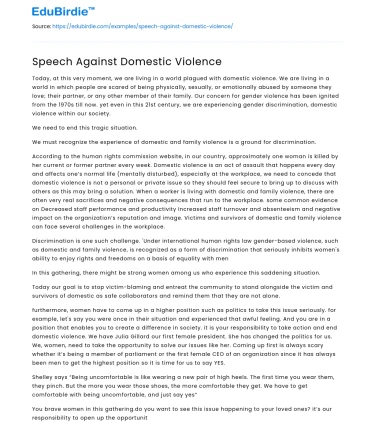Today, at this very moment, we are living in a world plagued with domestic violence. We are living in a world in which people are scared of being physically, sexually, or emotionally abused by someone they love; their partner, or any other member of their family. Our concern for gender violence has been ignited from the 1970s till now. yet even in this 21st century, we are experiencing gender discrimination, domestic violence within our society.
We need to end this tragic situation.
We must recognize the experience of domestic and family violence is a ground for discrimination.
According to the human rights commission website, in our country, approximately one woman is killed by her current or former partner every week. Domestic violence is an act of assault that happens every day and affects one’s normal life (mentally disturbed), especially at the workplace, we need to concede that domestic violence is not a personal or private issue so they should feel secure to bring up to discuss with others as this may bring a solution. When a worker is living with domestic and family violence, there are often very real sacrifices and negative consequences that run to the workplace. some common evidence on Decreased staff performance and productivity Increased staff turnover and absenteeism and negative impact on the organization’s reputation and image. Victims and survivors of domestic and family violence can face several challenges in the workplace.
Discrimination is one such challenge. 'Under international human rights law gender-based violence, such as domestic and family violence, is recognized as a form of discrimination that seriously inhibits women's ability to enjoy rights and freedoms on a basis of equality with men
In this gathering, there might be strong women among us who experience this saddening situation.
Today our goal is to stop victim-blaming and entreat the community to stand alongside the victim and survivors of domestic as safe collaborators and remind them that they are not alone.
furthermore, women have to come up in a higher position such as politics to take this issue seriously. for example, let's say you were once in their situation and experienced that awful feeling. And you are in a position that enables you to create a difference in society. it is your responsibility to take action and end domestic violence. We have Julia Gillard our first female president. She has changed the politics for us. We, women, need to take the opportunity to solve our issues like her. Coming up first is always scary whether it’s being a member of parliament or the first female CEO of an organization since it has always been men to get the highest position so it is time for us to say YES.
Shelley says “Being uncomfortable is like wearing a new pair of high heels. The first time you wear them, they pinch. But the more you wear those shoes, the more comfortable they get. We have to get comfortable with being uncomfortable, and just say yes”
You brave women in this gathering.do you want to see this issue happening to your loved ones? it’s our responsibility to open up the opportunities and conversations that the next generation of females come up with and change what we want.
Whilst it is good that celebrities are bringing attention to the #MeToo movement and the abusive and violent experiences of women at the hands of men, more celebrities - like Melissa Benoist - need to share their experiences with domestic violence and encourage people to donate money to support women in vulnerable situations in a meaningful and effective way. Wearing black to just one award show doesn't help anyone. Donating money to services that support women who have experienced domestic violence, and encouraging others to donate as well, is what actually saves women's lives.






 Stuck on your essay?
Stuck on your essay?

